COVER STORY
In the humanities, classrooms are labs and students are collaborators
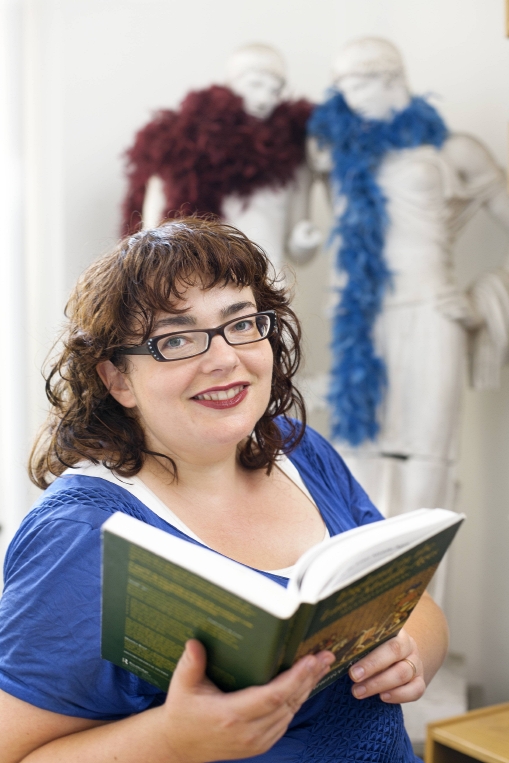
Masha Raskolnikov, associate professor of English.
The notebook on the table in front of Masha Raskolnikov, associate professor of English, holds only a few lines of text – the three points she absolutely must cover today. But what most interests her is what happens between these points, the experimental realm in the classroom where anything can happen.
Outside the window, the sun sparkles on a snow-covered slope, but no one is paying attention to its allure. A young woman is offering an insight about Shakespeare's famous stage direction from "The Winter's Tale": "exit, pursued by bear." The humor, the student says, comes from the fact that animal-human violence isn't as morally disruptive to us as human violence.
"What an interesting idea!" exclaims Raskolnikov. "I never thought of it that way."
The students may not have realized it, but Raskolnikov was having an "aha!" moment. Such moments happen for Raskolnikov – recipient of a 2008 Appel Fellowship for Humanists and Social Scientists – in virtually every class, though it is the process of discovery that advances her research rather than any individual insights in the classroom.
"By the end of the semester I know something I didn't know at the beginning, and it's because of the encounter with the text in the presence of the students," she says.
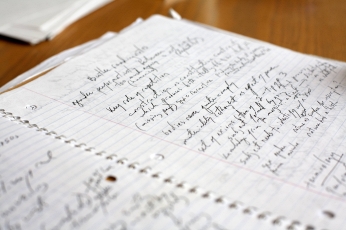
A view of one of Raskolnikov's notebooks in her office. See larger image
Similar scenes are repeated every day in humanities classrooms at Cornell, where students share their professors' research in exciting, unexpected ways. Indeed, in the humanities the classroom is as much laboratory as a place of learning.
To the nonspecialist, the question of how humanists approach the scholarship on which tenure and academic reputations rest may not be as clear as in the sciences, where researchers spend so much time in the lab or in the field. But as Peter Lepage, the Harold Tanner Dean of the College of Arts and Sciences, points out, "teaching often supports research in the humanities in a much more direct way than in the sciences."
Issues of interpretation and subjectivity are front and center in humanities classrooms, so that faculty have opportunities to address their research even in freshman courses.
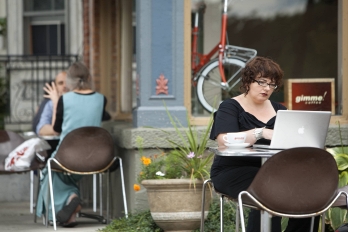
Raskolnikov at a local Gimme Coffee, working on a book project examining the kinds of revelations made by elaborate apologies, which are a mode all their own in medieval studies. See larger image
And the ideas emerging from Cornell's humanities classrooms are probably more diverse than at many other institutions because of the high percentage of students from Cornell's other six schools who also take classes in the College of Arts and Sciences. These students contribute perspectives from outside the humanities that enrich classroom discussion and encourage unconventional thinking.
The synergy between teacher and student works on behalf of the student, too. As Walter Cohen, associate dean of the College of Arts and Sciences, says, "Ideally the student gets my excitement and enthusiasm about the material, my sense of discovery that's supposed to be contagious. When this is working well, when we're discussing and debating ideas, then I'm modeling how one teaches and also how one approaches a research problem."
Laurent Dubreuil, professor of Romance studies, describes his experience of humanities classrooms as essentially Socratic, with teacher and student constructing the class together.
Setting the stage for a classroom-as-laboratory begins with the course syllabus. Before deciding on material, Raskolnikov considers how it will fit with her own interests and with what the students need to learn. The syllabus for her freshman writing seminar, "Apologizing Well, From Socrates to the Present," for example, went through six drafts. First she put in a Chaucer poem, then she deleted it. Socrates remained a mainstay, and at the last minute she added "Angels in America," Tony Kushner's Pulitzer Prize-winning play that raises questions of forgiveness reminiscent of "The Winter's Tale," another work that shaped the syllabus from its inception. Including a contemporary play like Kushner's in the syllabus is an experiment for Raskolnikov, a way to explore whether her book should be only about the Middle Ages or if it might include the way the meaning of apologies changes over the history of English literature.
For her freshman class, though, she includes an assignment that lets students bring in recent apologies of interest to them, thus including discussions of such public figures as Tiger Woods and the controversies surrounding them in her syllabus.
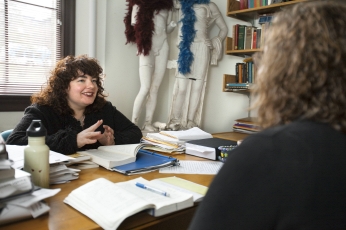
Raskolnikov chats with a student in her Goldwin Smith Hall office. See larger image
"I craft my classes in terms of questions that excite me and that I hope will excite students, too," explains Raskolnikov. "On a day-to-day, moment-by-moment basis, however, I don't need to pull the class into my research – we go where the texts take us, and class is driven by my students' questions and ideas, and by moments of insight that these bring about."
But Joseph Mansky '12 appreciates it when course content includes a professor's work. "I think it's great because we're being taught by some of the best scholars in the field," he says.
Because Raskolnikov's new book will include an exploration of Chaucer's self-abasement (he was always apologizing for his work) and how that colors scholars' view of his gender identity, she added "Troilus and Criseyde" to the syllabus for her 3000-level Chaucer class. The poem is notorious for its weepy male hero whom scholars – and Raskolnikov's students – deride for his excessive emotionality.
But Raskolnikov challenges the assumptions underlying the students' judgment. "When you write about Chaucer, you realize he's struggling with the same issues we're struggling with now, like gender stereotypes," says Raskolnikov. And understanding what medieval figures like Chaucer have to say enables her to bring to the classroom a unique historical perspective on contemporary issues.
As Patrizia McBride, associate professor of German studies, points out, "Research in the humanities seems very specialized when you look at it from the outside, but what gets forgotten is that through the layer of specialization we're often talking about issues that we're grappling with today."
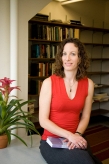
Karen Bennett, associate professor of philosophy See larger image
One of the most significant benefits of the classroom comes from the necessity of explaining the material. "The best way to fully understand a set of issues is to try to explain it to someone else," says associate professor of philosophy Karen Bennett, recalling times when she was preparing to teach something new that had seemed clear when she first read it, then suddenly realizing that the arguments made no sense, and she had to delve deeper into the material to be able to provide students with a coherent understanding.
Birthing ideas in the classroom
Chalk dust wafts through the small Goldwin Smith classroom as Raskolnikov draws a chart illustrating who knows what and when in "Troilus and Criseyde." The class has finally reached the end of the poem, and Raskolnikov asks her students to consider what Chaucer is really sorry about when he apologizes for his work. Is it the story, or is it the experiment he's conducting with the circularity of time and the results of foreknowledge?
"No one knows the answer. People don't even hypothesize about this very much, so I'm really genuinely asking the question," she tells her students.
As usual, the gap between question and answer never lasts very long in a Raskolnikov class, and hands instantly reach for the ceiling. One young man counters that the poem is based on another work, so it isn't really controversial; another student posits that the Christian message at the end of the poem is what troubles Chaucer.
It is in these "mess-ups and exchanges and incongruences between people and their readings where the magic happens," says Anna Corrigan '14. The careful way Raskolnikov gives credit for ideas to individual students during the course of class discussions encourages that magic.
"It's never one-sided in a class this small, which I think is one of the best parts. You can learn almost as much from your peers as you can from the professor," says Mansky.
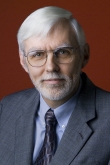
Peter Lepage, dean, College of Arts and Sciences See larger image
For Raskolnikov, learning from her students is not a matter of writing down what someone has said during a discussion. She wouldn't feel right putting a student's thoughts directly into her own work, even with attribution. What she gets instead from the students are difficult questions that make her think more creatively. As she writes in the acknowledgment of her first book, "Body Against Soul," students "challenged me to think beyond myself; nothing has pushed my thinking forward as much as engagement with all of you."
Lepage points out that "teaching forces you to drive to a deeper level than you have before. What the students are spectacularly useful for is undermining your picture with questions you hadn't thought of. They sort of destabilize your understanding. I just love those questions, because you know you're going to figure out something and at the end of it you know you'll understand it a little better than you did before. It's like someone gave you a present."
Associate professor of classics and Milstein scholar Verity Platt finds it very helpful to do close analysis of primary material with a group. It enables her to get to know the material in a much deeper way, which can serve as a springboard for new approaches. One class on painting she taught sparked so many ideas for articles that she's now planning a book to incorporate them all.
Although Platt recalls a few times when students have wanted to work directly on her research topic, the question of intellectual property hasn't really been a problem. "I always try to live by the principle that you need to be generous with ideas," she says. "Any intelligent, good academic has enough ideas to not be overly protective of things."
Trial run
Raskolnikov perches on the edge of the desk, looking out at the semicircle of students. It's the first class after spring break, and some of the students seem still to be recovering from their time off. One young woman in particular leans sleepily on her hand.
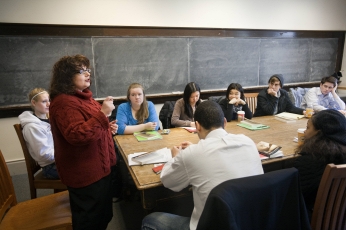
Raskolnikov facilitates a class discussion during her "Apologizing Well" freshman writing seminar in Goldwin Smith Hall in spring 2011. See larger image
It's a perfect opportunity for Raskolnikov to test her ideas. The sleepy woman is a bright student who can be counted on to make a comment whenever the material is particularly interesting. As she presents her new ideas, Raskolnikov watches the woman closely. When the sleepy student snaps to attention, Raskolnikov knows she has hit it right.
"You can just see from the way they're sitting when it works and when it doesn't work," says Raskolnikov. "When they're tuned in and really with you because you're right, you can feel them sort of vibrate at different frequencies."
Philosophy professor Bennett would no doubt agree. She often finds herself hurrying back to her office after a graduate seminar to take notes, because she's realized that "some argument I was trying to run just doesn't fly, or the way to do it is to go this other direction," she says.
Lightning strikes
Lightning struck for German studies professor McBride when she and her class were working on montages that merged object and text by combining visual elements. They were examining a work by a Dadaist (an adherent of an early 20th century absurdist movement), when a student suddenly pointed out that part of the image formed a word McBride had never noticed. "The student was able to define something that opened up a whole different reading of this image. This is what makes teaching so thrilling," she says.
Fundamentally, says Ivan Salinas '14, "the humanities is not a try and fail environment, it's more of an open-minded, critical environment that helps teachers with their research and students with their critical thinking.
"The things we learn in humanities classes stay with you for the rest of your life. In 30 years I might forget the quantity of an astronomical unit, but I will never forget what it means to apologize well."
Linda B. Glaser is a staff writer for the College of Arts and Sciences.